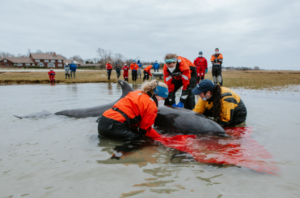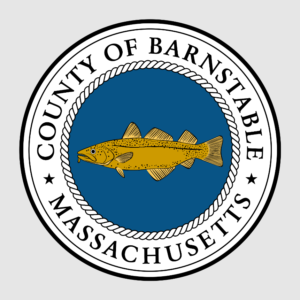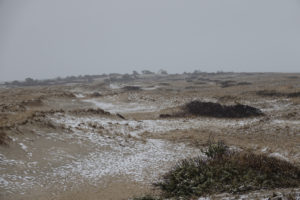
Photo courtesy of the IFAW
YARMOUTH – After two recent dolphin strandings on Cape Cod, a local biologist explained what rescuing the animals entails and signs the public can watch for to spot marine mammals in distress.
Animal Rescue Responder with the International Fund for Animal Welfare Kira Kasper said the response to save a large bottlenose dolphin on April 26 in Orleans relied on a crew of nearly 30 IFAW staff, interns, and trained responders to assist the over 700-pound creature.
For a dolphin rescue, Kasper said the response team uses a sling-like stretcher to get the animal onto a dolphin cart to help carry its weight and get it off the beach safely. The animal then goes into the team’s Mobile Dolphin Rescue Clinic.
“Essentially this is a vehicle that allows for us to run a full health assessment on the animal, provide them really critical treatments, a full suite of diagnostics, and all while transporting them to a better release site, which is really crucial to their survivability,” Kasper said.
The IFAW crew also uses the cart and stretcher to release dolphins back into the water where the rescuers typically tag the marine mammals with an identifier tag, let them acclimate, and send them back to sea.
Kasper said dolphins can end up stranded when they are swimming too close to shore as the tide recedes. When this happens, the marine expert said people should watch out for the creatures exhibiting a tight circling pattern as a sign a rescue may be necessary.
“If they’re doing that for prolonged periods but not able to find their way out when they do have access to deeper water potentially… that might be a good sign that the animal is likely going to require intervention,” Kasper said.
IFAW has an annual average of helping 262 stranded marine mammals over the last 24 years. Dolphin-related responses are more likely to occur in the winter or early spring, whereas seals are more likely to be spotted in the summer months.
Kasper highlighted how rescues rely on members of the public calling into the Marine Mammal Rescue Hotline when they see distressed animals in or near the water.
People can contact the IFAW’s 24/7 hotline at 508-743-9548. She also advised the public to keep a 150-foot distance from animals for safety.
IFAW responds to both live and dead marine animal calls on the Cape and throughout Southeastern Massachusetts. Head to their website for more information.
By Brian Engles, CapeCod.com NewsCenter






















